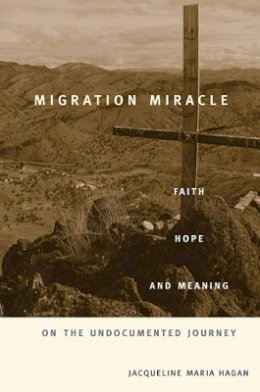
Migration Miracle: Faith, Hope, and Meaning on the Undocumented Journey
Jacqueline Maria Hagan
Since the arrival of the Puritans, various religious groups, including Quakers, Jews, Catholics, and Protestant sects, have migrated to the United States. The role of religion in motivating their migration and shaping their settlement experiences has been well documented. What has not been recorded is the contemporary story of how migrants from Mexico and Central America rely on religion—their clergy, faith, cultural expressions, and everyday religious practices—to endure the undocumented journey.
At a time when anti-immigrant feeling is rising among the American public and when immigration is often cast in economic or deviant terms, Migration Miracle humanizes the controversy by exploring the harsh realities of the migrants’ desperate journeys. Drawing on over 300 interviews with men, women, and children, Jacqueline Hagan focuses on an unexplored dimension of the migration undertaking—the role of religion and faith in surviving the journey. Each year hundreds of thousands of migrants risk their lives to cross the border into the United States, yet until now, few scholars have sought migrants’ own accounts of their experiences.
Product Details
About Jacqueline Maria Hagan
Reviews for Migration Miracle: Faith, Hope, and Meaning on the Undocumented Journey
Douglas S. Massey, Princeton University Jackie Hagan's beautifully written book opens up new territory in the field. She not only sheds light on a neglected dimension of migration, but also describes in intimate detail how spirituality and religious practice help migrants face the dangers and uncertainties inherent in that process. Hagan's lucid writing draws on an international sample of extensive interviews and ethnographic data.
Robert Smith, Baruch College, CUNY Migration Miracle is a deep and nuanced engagement with religion and faith in Latin American migration odysseys. By examining the real needs of undocumented migrants, Hagan offers new insights for those who work with migrants during these incredibly difficult journeys. This groundbreaking study should inspire similar research in Africa and elsewhere, where much work still needs to be done in understanding the role of religion in the migration process. Migration Miracle paves the way for a new way of thinking about migration in the twenty-first century.
Archbishop Michael A. Blume, SVD, Apostolic Nuncio in Benin and Togo; Undersecretary of the Pontifical Council for the Pastoral Care of Migrants and Internant People, 2000-2005 It will be an essential text for scholars of religion and migration, and likely a favorite in graduate seminars. Migration Miracle should also be read by scholars interested in the theoretical explanations for migration, as it adds complexity to the traditional economic explanations of why people leave. But the audience most in need of this book is the policy makers who, in their narrow focus on the economic and political ramifications of undocumented migration, have forgotten that migrants are not mere economic units but human beings who face inhuman conditions in their attempts for survival and the survival of their families, beseeching God along the way.
Stephanie J. Nawyn
American Journal of Sociology
